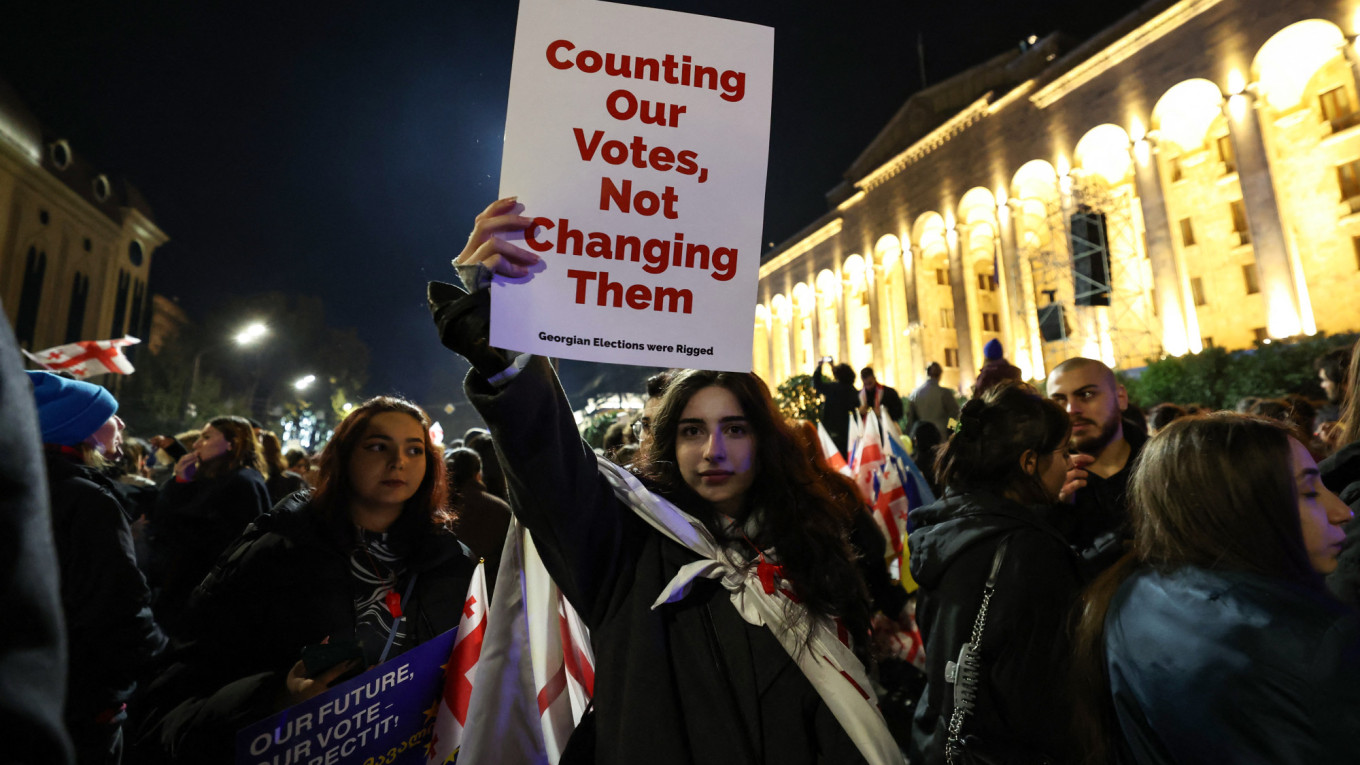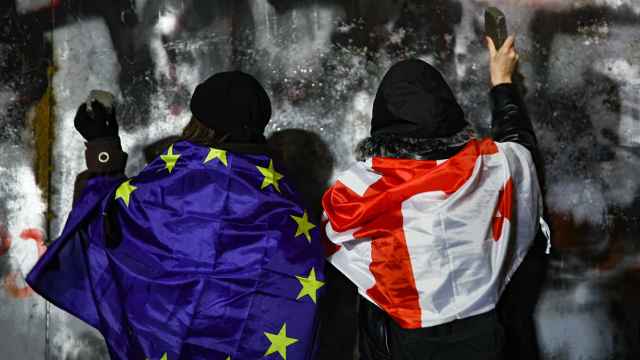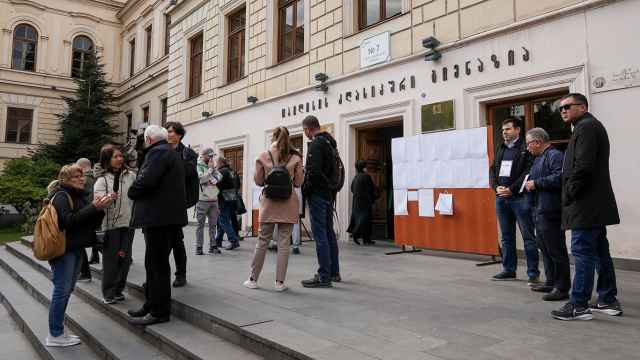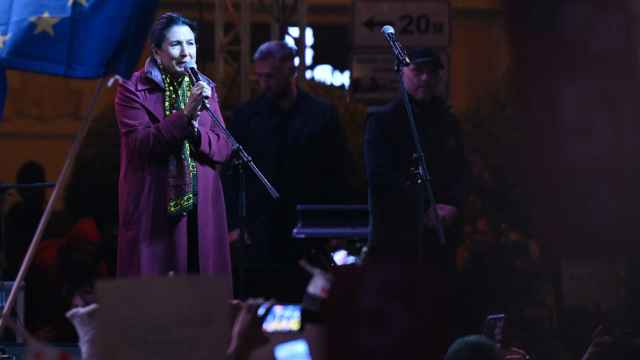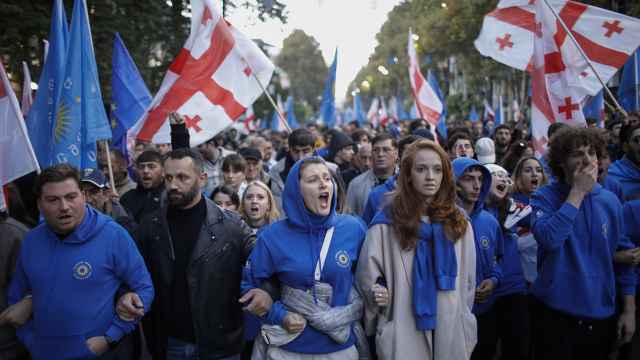Georgians protested on Saturday as the poll commission rubber-stamped the ruling party's victory in a controversial parliamentary vote marked by claims of Russian meddling and Western calls to investigate fraud allegations.
The Caucasus nation's pro-Western opposition has denounced the Oct. 26 vote as "fraudulent," while the European Union and the United States have called for a probe into alleged electoral "irregularities."
The Georgian Dream party won 53.93% of the votes against 37.79% garnered by a union of four opposition alliances, the National Election Commission said.
Critics have blamed the increasingly conservative party for derailing Georgia from its European path and bringing Tbilisi back into Moscow's orbit.
Saturday's final results by the electoral commission give Georgian Dream 89 seats in the 150-member parliament, which the opposition deems "illegitimate" and has refused to enter.
The Interior Ministry said it has initiated a criminal probe against the commission's opposition member who splashed black paint on the face of its chair, Giorgi Kalandarishvili, briefly disrupting the commission's session before the results were announced.
The ministry also said police have detained three anti-government demonstrators at a protest outside the commission's headquarters, the latest in a series of rallies against the disputed results since the October vote.
President Salome Zurabishvili — at loggerheads with the governing party — has also described the vote as illegitimate and accused Russia of interference. Moscow has denied meddling.
The figurehead leader joined the opposition's calls for a fresh vote, saying she would not issue a decree to convene the new parliament.
'Russian tail'
Tens of thousands have taken to the streets in Tbilisi to protest alleged electoral fraud.
Universities in big cities across Georgia were gripped by student protests on Friday evening and the opposition has announced a fresh mass rally when the newly elected legislature holds its first session.
Prime Minister Irakli Kobakhidze has insisted the elections were free and fair and said parliament would convene within 10 days after the final results' release — even without a presidential summons from Zurabishvili.
Last week, Kobakhidze threatened to ban all main opposition parties — "if they persist in actions that violate the constitution" — despite his party's failure to secure the 113-seat "constitutional majority" it had sought to enact such a ban.
A group of Georgia's leading election monitors has said they had uncovered evidence of a complex scheme of large-scale electoral fraud that swayed results in Georgian Dream's favor.
U.S. pollster Edison Research, whose exit poll had predicted victory for opposition forces, has said the discrepancy between its forecast and official results "cannot be explained by normal variation" and "suggests local-level manipulation of the vote."
All of Edison's previous exit polls conducted since 2012 in Georgia were in line with official results.
Its exit poll models used in Georgia were the same ones Edison Research used in the U.S. presidential election exit polls for ABC, CBS, CNN and NBC.
International election watchdog Europe Elects has said the analysis of data available from the Central Election Commission "was able to independently reproduce the signs of fraud" in favor of the ruling party.
That includes a statistical abnormality called "Russian tail," a suspicious spike in voter distribution often observed in Russian elections, the group said.
Earlier this month, EU Council chief Charles Michel said "there are serious suspicions of fraud, which require a serious investigation."
Ahead of the election, Brussels had warned the vote would determine EU candidate Georgia's chances of joining the bloc.
A Message from The Moscow Times:
Dear readers,
We are facing unprecedented challenges. Russia's Prosecutor General's Office has designated The Moscow Times as an "undesirable" organization, criminalizing our work and putting our staff at risk of prosecution. This follows our earlier unjust labeling as a "foreign agent."
These actions are direct attempts to silence independent journalism in Russia. The authorities claim our work "discredits the decisions of the Russian leadership." We see things differently: we strive to provide accurate, unbiased reporting on Russia.
We, the journalists of The Moscow Times, refuse to be silenced. But to continue our work, we need your help.
Your support, no matter how small, makes a world of difference. If you can, please support us monthly starting from just $2. It's quick to set up, and every contribution makes a significant impact.
By supporting The Moscow Times, you're defending open, independent journalism in the face of repression. Thank you for standing with us.
Remind me later.


